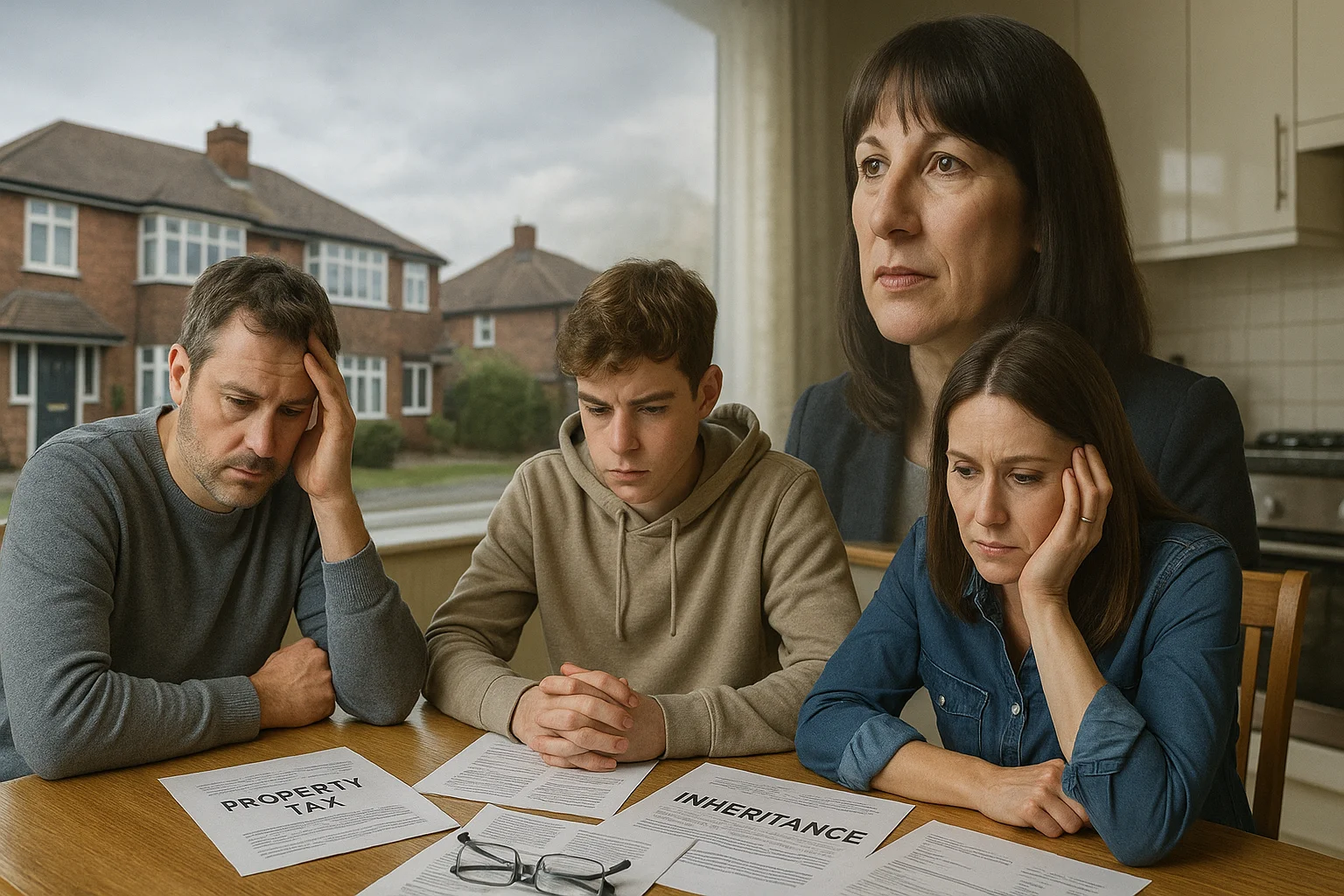Table of Contents
ToggleAmid growing concerns about the UK’s fiscal direction, Chancellor Rachel Reeves is reportedly considering a controversial property tax reform that critics are calling a “back door death tax.”
Designed to raise revenue without directly increasing income tax, the proposal could impact millions of homeowners by introducing deferred charges on high-value properties payable upon sale or death.
As debate intensifies, families across the UK are questioning how these changes could affect inheritance planning, property ownership, and long-term financial security.
What Is Rachel Reeves’ Proposed “Back Door Death Tax”?
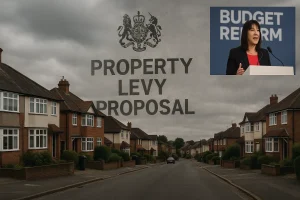
The concept of a “back door death tax” has emerged as a result of reports indicating Chancellor Rachel Reeves is exploring new property tax reforms.
These reforms are centred around introducing a charge on high-value properties, not at the point of purchase or annually through traditional council tax structures, but either when the property is sold or when the owner dies.
This deferral-based system means homeowners may not need to pay additional tax upfront. However, the charge could accumulate over time and would be payable later, potentially with interest.
The approach is considered controversial because, although not officially branded as inheritance tax, the payment structure mimics one.
By attaching a financial obligation to the point of death, the policy effectively introduces a second layer of taxation on estates, alongside the existing 40% inheritance tax on estates valued above the threshold.
Critics argue that this type of taxation is particularly unfair to individuals who are house-rich but income-poor.
These homeowners, especially pensioners who have lived in the same home for decades, could find themselves or their families burdened with significant costs that were not expected.
How Could the Tax Changes Affect UK Families Financially?
Families could face considerable financial pressures as a result of these reforms. The proposed changes would revalue approximately 2.4 million high-value properties for council tax purposes. This could lead to higher council tax bills or deferred tax obligations, impacting the financial landscape of many households.
Those most likely to be affected include retirees who may not have significant income or savings but who own properties that have risen dramatically in value over the years.
With the ability to defer the tax until sale or inheritance, the cost might not be felt immediately, but it will still be substantial when due.
Key implications include:
- Interest may be applied to deferred payments, increasing the eventual liability
- Families could be required to settle large bills during estate processing
- Tax planning becomes more complex, especially for estates involving multiple heirs
The table below illustrates possible financial outcomes based on different property values and potential deferral timelines.
| Property Value | Estimated Annual Surcharge | Estimated Deferred Payment Over 10 Years (with interest) |
| £750,000 | £1,200 | £15,000 – £17,000 |
| £1,200,000 | £2,000 | £24,000 – £28,000 |
| £2,000,000 | £3,500 | £40,000 – £45,000 |
This type of deferred taxation may especially strain families who plan to retain inherited property, rather than sell it immediately.
Why Is This Being Labelled a “Back Door” Inheritance Tax?
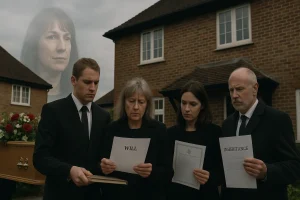
Political opponents have widely criticised this proposal, arguing that although it avoids the direct label of inheritance tax, it mirrors its impact. When a financial obligation is imposed at the point of death, it creates a clear parallel with traditional inheritance taxation.
Several high-profile figures have spoken out against the policy. Sir Mel Stride described it as a new form of death tax, while Kemi Badenoch stated that it penalises older generations who made responsible financial choices.
The use of the term “back door” implies that the policy circumvents transparent taxation practices, raising questions about political intent and voter trust.
Further concern stems from the emotional impact such a policy might have. During a period of mourning, families could be forced to manage unexpected financial strain and rushed property decisions.
This blends fiscal policy with deeply personal experiences, which can heighten public opposition.
Who Will Be Most Affected by the New Council Tax Valuation?
The most significant changes are expected to affect property owners in regions with high market values. London, parts of the South East, and desirable suburban areas are likely to see the largest revaluations.
Properties currently sitting in lower council tax bands may be moved into higher bands, increasing their annual tax burden.
Groups most likely to be affected include:
- Homeowners with properties valued above £750,000
- Retirees who have lived in the same home for 30 years or more
- Inheriting families who may have to sell property to pay taxes
- Landlords with multiple high-value properties
The following table outlines the estimated revaluation impact on different property bands.
| Current Band | Potential New Band After Revaluation | Estimated Annual Council Tax Increase |
| Band D | Band F | £600 – £1,000 |
| Band E | Band G | £800 – £1,400 |
| Band F | Band H | £1,200 – £2,000 |
This could push pensioners or those on fixed incomes into positions where they are forced to reconsider how they use or pass down their properties.
Is This a Fair Approach to Addressing Economic Challenges?
Rachel Reeves has positioned her approach as a method to ensure fiscal responsibility while also targeting wealth that has gone largely untaxed. The government’s challenge is to increase tax revenue without directly increasing income tax, which would be politically sensitive and break election pledges.
Supporters of the back door death tax argue that:
- It is a progressive tax that targets unearned wealth
- It avoids penalising earned income from working families
- It gives property-rich homeowners flexibility via the deferral system
The Institute for Fiscal Studies has also lent support to the proposal, suggesting that deferring tax obligations until sale or death is a pragmatic way to collect revenue from individuals who are not liquid in cash but hold substantial assets. The model proposed includes charging interest on deferred amounts, making it function more like a loan than a gift.
Despite this, fairness remains in question. The tax could disproportionately affect elderly homeowners who never intended to sell their property and had planned to pass it on. Critics argue that a “fair” system should not burden people at the end of life or disrupt intergenerational wealth transfers without clear communication and safeguards.
What Other Tax Reforms Are Expected in the Upcoming Budget?
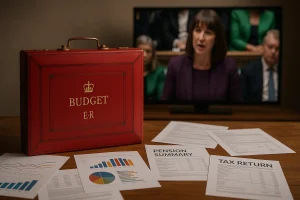
Beyond the proposed changes to property taxation, the upcoming Autumn Budget is expected to introduce a series of additional fiscal reforms aimed at addressing the UK’s growing revenue requirements.
Rachel Reeves, under pressure to stabilise public finances while avoiding direct income tax hikes, is targeting several indirect methods to raise funds. These measures are likely to impact pensions, savings, and employment benefits, areas where reforms can generate substantial income without immediately hitting household pay packets.
Income Tax Threshold Freeze and Fiscal Drag
While a rise in income tax rates has been ruled out, the government is expected to extend the current freeze on income tax thresholds until 2030. This policy, commonly referred to as “fiscal drag”, means that as wages rise due to inflation or promotions, more individuals will fall into higher tax bands. even though tax rates remain unchanged.
This subtle yet powerful mechanism allows the Treasury to raise an estimated £8 billion without breaching political promises. However, it places increasing tax pressure on middle-income earners, particularly those just crossing into higher brackets.
Pension Tax Relief Reform
One of the more significant anticipated reforms concerns pension tax relief. Currently, pension contributions benefit from tax relief at varying rates, 20% for basic-rate taxpayers, 40% for higher-rate taxpayers, and 45% for additional-rate taxpayers.
Under the new proposals, Reeves is reportedly considering introducing a flat rate of 25% for all income groups. This change would reduce benefits for higher earners while slightly increasing them for some lower earners. Though intended to simplify the system and improve fairness, the reform could discourage additional pension contributions from those in higher tax brackets.
Cuts to Tax-Free Pension Lump Sums
There is also speculation that the current allowance enabling individuals to withdraw 25% of their pension pot tax-free up to £268,275 could be reduced. This change would result in a larger portion of pension savings being subject to income tax upon withdrawal. For those approaching retirement, it may significantly impact their financial plans, especially for lump-sum expenses such as mortgage repayments or large purchases.
Additional Measures Under Consideration
Other areas reportedly under review include:
- Increased duties on gambling operators and high-stakes betting
- A crackdown on salary sacrifice schemes that reduce taxable income
- Reevaluation of capital gains tax reliefs
These reforms, while less visible to the general public, are designed to close tax loopholes and generate revenue from under-taxed sectors.
How Can Families Prepare for Possible Inheritance and Property Tax Changes?
With uncertainty surrounding the final form of these policies, families should consider revisiting their estate and financial planning arrangements. Delayed taxation can be as impactful as immediate taxation, particularly if it involves growing interest or changing thresholds.
Here are some recommended steps:
- Review current property values and potential exposure to council tax revaluation
- Consider early inheritance transfers or gifting strategies to reduce estate size
- Work with tax advisors to explore use of trusts or other legal structures
- Prepare liquidity plans in case assets like property need to be sold to settle taxes
- Stay informed about Budget announcements and legislative changes
While definitive planning may be premature, creating flexible strategies that can adapt to policy shifts is a prudent approach. Ensuring documentation is up to date and that family members understand the estate’s structure can also reduce stress if these new tax mechanisms come into effect.
Could This Policy Damage the UK’s Aspirational Homeownership Culture?
Homeownership has long been a central pillar of British life, symbolising financial independence, security, and success. Many people have invested their savings, effort, and long-term plans into owning property, often with the hope of passing it down to the next generation.
The introduction of additional taxes tied to property ownership and inheritance threatens to shift that cultural ideal. If families face heavy financial penalties simply for inheriting a home, the incentive to invest in property could decline.
Critics argue that this could lead to:
- A fall in long-term property ownership
- Increased selling of inherited homes to cover tax costs
- Reduced intergenerational wealth transfer
- Negative sentiment among young people about property investment
In areas where property values are high but incomes are not, local residents could feel unfairly targeted, potentially losing homes that have been in families for generations.
Is Rachel Reeves’ Strategy a Necessary Move or a Political Gamble?
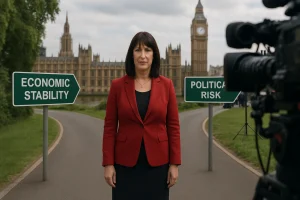
Rachel Reeves faces a significant challenge in maintaining economic stability while navigating public expectations and political promises. Her decision to pull back from an income tax rise earlier this year created a funding gap that must now be filled through alternative means.
The back door death tax and associated reforms could be interpreted as creative fiscal management. However, the political risk is high. Hidden or indirect taxes often attract criticism, particularly when they affect emotionally sensitive issues such as family homes and inheritances.
Her strategy may find favour with economists and fiscal policy experts but could alienate sections of the electorate. If the public perceives the reforms as unfair or unclear, it could undermine Labour’s broader message of fairness and economic recovery.
Conclusion
The debate around Rachel Reeves’ so-called back door death tax reflects deeper anxieties about wealth, inheritance, and fairness in modern Britain. While supporters see it as a rational solution for a cash-strapped government, opponents view it as a cynical cash grab during times of personal hardship.
Ultimately, the policy, if implemented, will test public tolerance for creative taxation and may influence the political landscape in the months leading up to the next general election. Transparency, fairness, and a focus on protecting the vulnerable will be essential to its success or failure.
FAQs About the Back Door Death Tax and Rachel Reeves’ Budget Plans
What does the term “back door death tax” actually mean?
It refers to a proposed policy where homeowners pay additional tax on high-value properties either when they move or after they pass away. Critics argue it resembles an indirect inheritance tax.
Will the new tax apply to all homeowners in the UK?
No, it’s expected to primarily impact those with high-value homes, especially in London and the South East. Around 2.4 million homes could be revalued.
Can families avoid paying the deferred tax?
While avoidance isn’t possible, mitigation through financial planning, use of exemptions, or restructuring of ownership might help reduce liabilities.
How much could this tax cost an average family?
Estimates suggest it could add thousands of pounds in deferred council tax, especially if interest is applied. Final costs would depend on property value and duration of deferral.
Is this tax the same as inheritance tax?
No, but it functions similarly by adding a cost at the point of death. It would be an additional burden on top of the existing 40% inheritance tax for qualifying estates.
When will we know if this policy is confirmed?
Full details are expected in the Autumn Budget on 26 November 2025, when Rachel Reeves will present her fiscal plans.
What should homeowners do right now?
Start by reviewing their property value, consulting financial advisors, and exploring strategies to plan for possible tax changes in 2025 and beyond.

